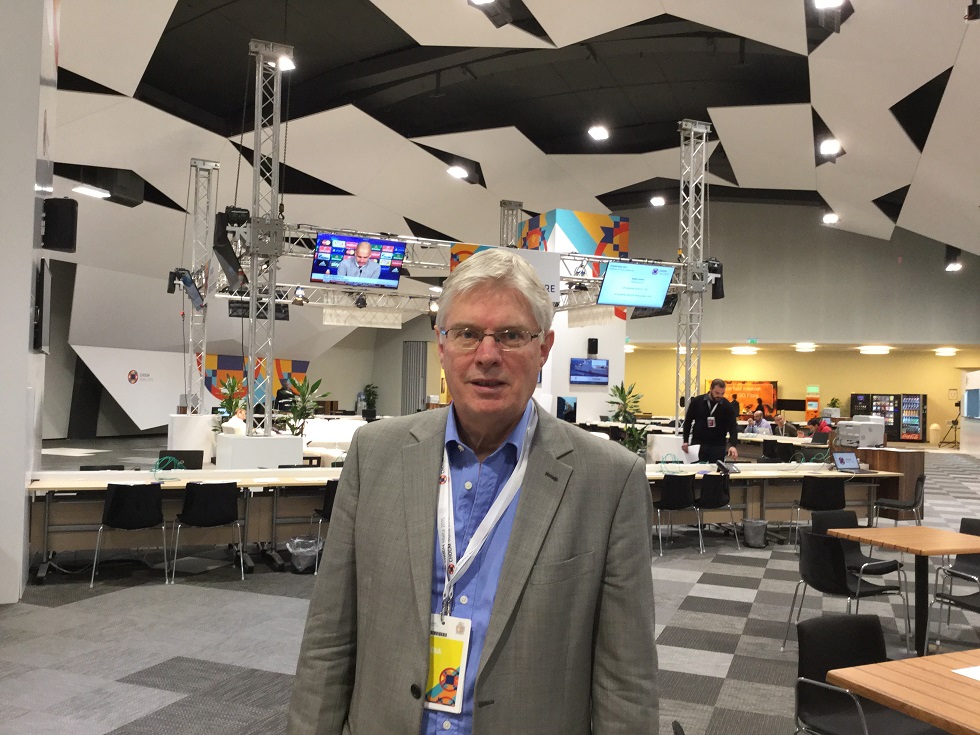 The Chairman of the Round Table Stuart Mole provides a behind-the-scenes look at the Commonwealth Summit.
The Chairman of the Round Table Stuart Mole provides a behind-the-scenes look at the Commonwealth Summit.
Prologue
It is little surprise that Malta’s capital, Valletta, already a UNESCO world heritage site should be set to become a European Capital of Culture in 2018. Its old limestone buildings, with their painted wooden balconies, are laid out in perfect symmetry within the great walls and bastions of their founder, Grand Master de Valette.
Many of the buildings are undergoing renovation and restoration, and within ancient exteriors there are a growing number of modern apartments and trendy restaurants. But there are still reminders of the devastating damage inflicted on the city between 1940 and 1943, when 3,000 air raids by Italian and German bombers pulverised the docks and residential areas.
For decades, the ruins of the beloved National Opera House lay undisturbed, a painful reminder both of the past and of the indecision that has paralysed any action on the site since.
That has changed with the commission given to the Italian architect, Renzo Piano. The man who gave London the Shard was tasked with building a new national parliament and transforming the area around the gates of the old city. The old Opera House has become an open-air performance area.
The results are striking and, for some, controversial. And it was into this building that three aspirants for the post of Commonwealth Secretary-General trooped this week, for a first-ever public hustings. This was yet another example of Malta’s ability to enliven an old institution in a creative and innovative way.
Of course, none of the 200 strong audience assembled in the chamber of the parliament were actually voters in the election, or likely to have any influence upon it. But they reflected a real, but largely unrecognised constituency – the “people’s Commonwealth” of civil society and Commonwealth non-governmental organisations. For all sorts of reasons, the successor to the current incumbent, Kamalesh Sharma, would be their Secretary-General too.
First to speak was the former Deputy Secretary-General, responsible for political affairs, Mmasekgoa Masire-Mwamba. The nominee of Botswana, “triple M” (as she is known) is said to enjoy widespread support in Africa. She spoke confidently, though with a tendency sometimes to sound like a United Nations’ communiqué. Next up was Patricia Scotland. Conscious of attacks on her from her rivals in the Caribbean for being the “British Baroness”, she stressed her Caribbean and indigenous peoples origins. Born in Dominica, she also claimed Carib ancestry, and was silent on any acquired British nobility. Last to address the hall was Sir Ron Sanders, a diplomat from Antigua & Barbuda and a veteran campaigner against apartheid. A former member of the Eminent Persons Group of 2010-11 which reported on the future of the Commonwealth, he was fluent and passionate, drawing on a fund of Commonwealth experience.
With little between the candidates, question time increased the pressure. On gay rights, Masire-Mwamba – as the African candidate – was expected to be on the back foot. But she dealt with the question deftly, admitting that the Commonwealth was a “divided house” but speaking of a recent visit to Little Rock, Arkansas, and the civil rights struggles in the USA. For her, the language used by those who opposed racial equality was much the same – and as unacceptable – as those opposing sexual equality.
But it was on gender where a stumble occurred. Malta’s initiative in hosting the first-ever Women’s Forum has had a big impact and helped create a mood that it was time for women to play a greater part in the Commonwealth’s leadership. In that respect, with two of the three candidates being female, expectation was in the air. The moment came with a pair of questions, one of which was from a female activist from Swaziland, on the inclusion of women. Sanders was first to reply and, for whatever reason, concentrated his allotted five minutes in responding to the other question, neglecting the one on gender. Scotland was quick to pounce, remarking how easy it was for women to be “forgotten”, and treated as an add-on. The point hit home with obvious effect.
The debate was an “historic moment”, in the words of the Speaker, but will be no real guide to the drama which will play out as the Heads of Government meeting gets under way. Neither of the Commonwealth’s two female Heads of Government are attending the summit (though there are a handful of women heads of delegation). If Scotland was widely deemed to have won the debate on points from Sanders, the next morning saw a vicious exchange of mutual character assassination in the media. The Daily Telegraph resurrected financial corruption allegations against Sanders and a Caribbean agency responded with an equally unpleasant story, reminding its readers of a minor scandal about Scotland’s au pair.
What seems unlikely is that any of the “dark horse” candidates are likely to leave the stable. But whoever finally emerges victorious from the closed session, he or she will have a monumental task ahead in breathing fresh life and purpose into an association that has lost its way in recent years.



